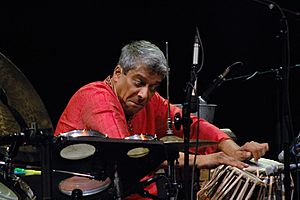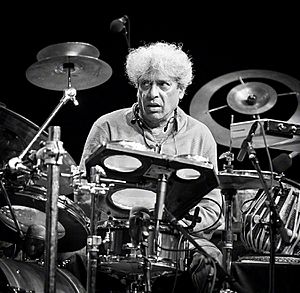Trilok Gurtu facts for kids
Quick facts for kids
Trilok Gurtu
|
|
|---|---|

Gurtu performing in Warsaw with Arkè String Quartet
|
|
| Background information | |
| Born | 30 October 1951 Mumbai, India |
| Genres | |
| Occupation(s) | Musician |
| Instruments | Drums, tabla, Konnakol |
| Years active | 1970s–present |
| Associated acts | John McLaughlin, Embryo, Oregon, Tabla Beat Science, Arkè String Quartet, Joe Zawinul, Jan Garbarek |
Trilok Gurtu (born October 30, 1951) is a famous musician from India. He plays percussion instruments and writes music. His music mixes traditional music of India with jazz fusion (a type of jazz that blends with other styles) and world music (music from different cultures).
Trilok Gurtu has worked with many other talented musicians. Some of these include John McLaughlin, Joe Zawinul, and Robert Miles.
Contents
Early Life and Musical Start
Trilok Gurtu was born in Mumbai, India. His parents were from different parts of India. His mother, Shobha Gurtu, was a well-known singer of Indian classical music.
She encouraged him to learn the tabla, which is a pair of drums used in Indian music. He also received special training in percussion from Shah Abdul Karim.
Musical Journey and Style
Starting with Western Drums
In the 1970s, Trilok Gurtu started playing a Western drum kit. He became very interested in jazz music. He once shared that he learned Western music without knowing about "overdubbing." This is a technique where musicians record different parts of a song separately. Because he didn't know about it, he learned to play many parts at once, which was very difficult!
During the 1970s, he played with jazz musicians like Charlie Mariano and Don Cherry. One of his first recordings was on an album called Apo-Calypso in 1977. His mother also sang on this album and later joined him on his first solo CD, Usfret.
Playing with John McLaughlin
In the 1980s, Gurtu played with John McLaughlin in his trio. They often used a special Indian method called tala talk. This is a way of using sounds and words to teach drum patterns. Sometimes, they would even add funny words, mixing Japanese brand names with Indian words, to make their vocal percussion jams unique.
Unique Drumming Techniques
Trilok Gurtu has a very special way of playing drums. He often plays without a drum stool, sitting in a half-kneeling position on the floor. He also uses an unusual kick drum and mixes traditional Indian tablas with Western drums.
One of his most unique techniques is dipping cymbals and strings of shells into a bucket of water. This creates a shimmering, watery sound effect.
Joining the Band Oregon
After the drummer for the band Oregon passed away, Trilok Gurtu joined them. He played on three of their albums: Ecotopia (1987), 45th Parallel (1989), and Always, Never and Forever (1991).
Solo Career and Collaborations
In the early 1990s, Gurtu started focusing on his solo career and leading his own band. Many famous musicians have played with him on his albums.
In 1999, he joined a group called Tabla Beat Science. This group mixed Indian music with electronic music styles like Drum and Bass. They released three albums.
In 2004, Gurtu made an album called Miles Gurtu with Robert Miles. He also started working with the Arkè String Quartet in 2007, releasing the album Arkeology.
More recently, in 2012, Trilok Gurtu worked with the electronic folk duo Hari & Sukhmani. They created a song called 'Maati' for a music documentary.
Impact and Recognition
Trilok Gurtu is known as one of the most creative and groundbreaking percussionists. He often uses unusual items like swords and buckets to make unique sounds in his music.
Another famous musician, Zakir Hussain, once said that if Trilok Gurtu only played the tabla, he would still be the best tabla player in the world.
Even the famous electronic music artist Deadmau5 (Joel Zimmerman) looks up to Trilok Gurtu. He has said that Indian traditional rhythms and patterns are amazing and that Trilok Gurtu has incredible skills.
Awards and Achievements
Trilok Gurtu has won many important awards for his music, including:
- Best Overall Percussionist from DRUM! Magazine in 1999.
- Best Overall Percussionist at the Carlton Television Multicultural Music Awards in 2001.
- Best Percussionist in Down Beat's Critics Poll multiple times (1994, 1995, 1996, 1999, 2000, 2001, and 2002).
- He was also nominated for Best Asia/Pacific Artist by BBC Radio 3 World in 2002, 2003, and 2004.
Discography
As a Leader
- Usfret (CMP, 1988)
- Living Magic (CMP, 1991)
- Crazy Saints (CMP, 1993)
- Believe (CMP, 1994)
- The Glimpse (CMP, 1996)
- Bad Habits Die Hard (CMP, 1996)
- African Fantasy (ESC, 1999)
- Kathak (Escapade, 1998)
- The Beat of Love (Blue Thumb, 2001)
- Broken Rhythms (Worldmusicnet, 2004)
- Farakala (Frikyiwa, 2005)
- Arkeology with Arke String Quartet (Promo Music, 2006)
- Massical (BHM, 2009)
- 21 Spices (Art of Groove, 2011)
- Broken Rhythms (Cream, 2012)
- Spellbound (Moosicus, 2013)
- Drums On Fire with Chad Wackerman (Times Music, 2015)
- Crazy Saints Live (Art of Groove, 2015)
- God Is a Drummer (Jazzline, 2019)
- One Thought Away (Jazzline, 2023)
- Mirror (Worldwide, 2025)
With Family of Percussion
- Message to the Enemies of Time (Nagara, 1978)
- Sunday Palaver (Nagara, 1980)
- Here Comes the Family (Nagara, 1981)
See also
 In Spanish: Trilok Gurtu para niños
In Spanish: Trilok Gurtu para niños


